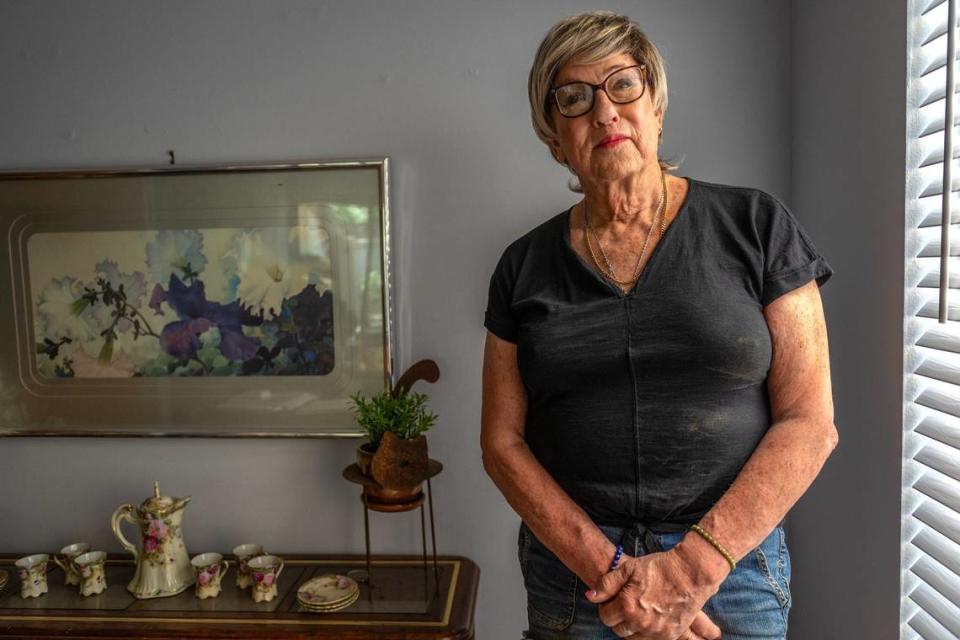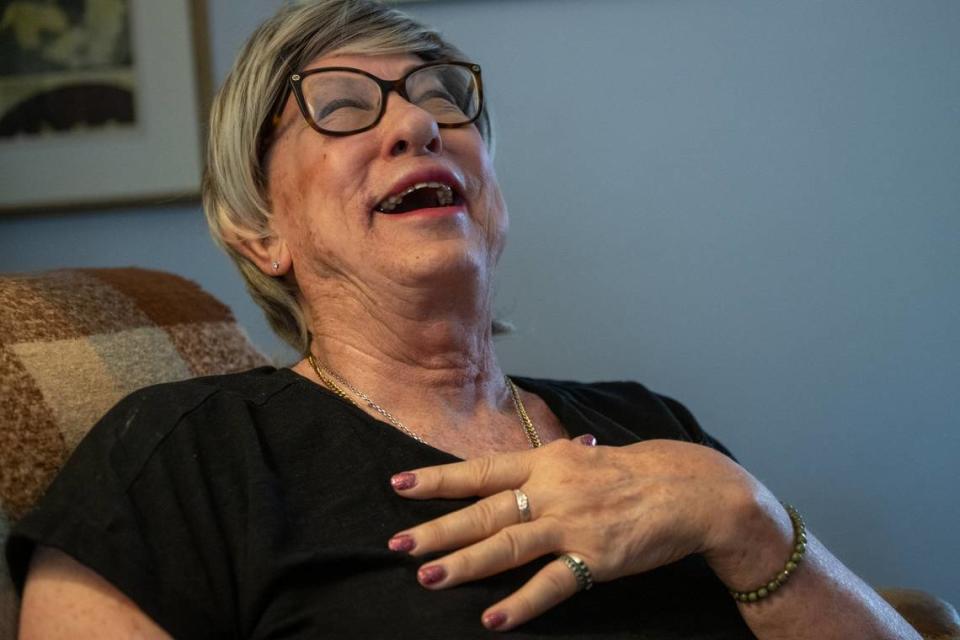Sacramento’s Stephanie Haskins shares her gender transition story in new documentary
For around 25 years, Stephanie Haskins had hints she might be a transgender woman.
Haskins was known for much of her life as Steve Haskins, a veteran of the broadcast news industry for outlets like KCRA and later a spokesperson in state politics. But Haskins never felt comfortable in her body.
“When I came out four years ago, I knew I had no choice,” Haskins said. “I wanted to be perceived as the person I was inside.”
Haskins, 76, became one of the oldest known people to have gender confirmation surgery last year. Her experience and previous life is chronicled in a documentary produced by former KCRA colleague Joyce Mitchell, “Never Too Late?” that will premiere later this month at The Sofia playhouse in Sacramento.
Haskins said she’s “so incredibly proud to be a trans woman,” speaking for nearly an hour with The Sacramento Bee the day before she saw the completed documentary for the first time. But it wasn’t always this way.

‘A life-saving journey’
For years, Haskins kept questions about herself hidden and suffered emotionally. Through intensive therapy, she came to understand her transgender identity.
An editor’s note for a series of columns that Haskins began writing for The Reporters Inc. chronicling her transition noted, “Haskins considered herself to be a closeted gay man for most of her life, but after years of emotional turmoil and deep depression, she came out as transgender (male to female) in 2019.”
Coming out was a gradual process, with Haskins slowly reaching out to people in her life and also beginning to have transitional surgeries, which led to gender-confirmation or bottom surgery in 2022. Not every transgender person chooses to have this surgery.
Haskins messaged Mitchell on Facebook to reconnect three years ago. Mitchell and Haskins had last touch after decades of knowing one another through their work on KCRA’s 11 p.m. news show and later at KOVR. Mitchell asked where Haskins had been. Haskins replied she was now a woman. The two soon made plans to meet up.
“I knew it was a life-saving journey for her,” Mitchell said. “And I became a support system right then and there.”

Long before transitioning, Haskins was professionally successful and locally influential. Years at KCRA and later KOVR and KTXL led to stints in California state government, producing documentaries under longtime Assembly Speaker Willie Brown and later working under governors Gray Davis and Arnold Schwarzenegger.
But even back to her teenage years, Haskins didn’t want to be who she was. She wanted to be William Holden or Rock Hudson, though Haskins didn’t have the body. “So I created this persona, I guess and went with that,” Haskins said. “But it was all self-taught. And it was all an imitation of somebody else.”
Haskins didn’t hate her life as a male. Things just eventually got to a point where, she said, she “couldn’t sustain it any longer.” In the documentary about her, she briefly discussed the possibility of suicide, saying she thought of mixing alcohol with a prescription drug and going to sleep.
“I cannot imagine that there’s a single transgender person whom at one point didn’t get down on their knees and pray to God that they wouldn’t be transgender anymore,” Haskins said. “It’s a very difficult decision. It’s a hard way to lead your life. It’s something you have to do if you acknowledge yourself, your own sensibilities. But it’s not something that people wish for themselves.”
Instead, Haskins chose to go to therapy where she learned she was transgender.
As a retired state employee by the time Haskins was ready to transition, she had top-tier health insurance through Kaiser and had heard about the system’s gender transition program. Aside from seeing a therapist, Haskins also began receiving hormone replacement therapy and, in time, underwent several transitional surgeries.
There was breast augmentation and facial feminization, among other procedures. Even being in her 70s, Haskins didn’t fear the array of work. “For me, surgery is just surgery, it’s not something to be afraid of,” Haskins said. “I’ve worked my butt off, getting in shape so I could have the surgeries.”
When Haskins had gender-confirmation surgery in San Francisco on June 10 of last year, Wayne Freedman, a former KGO reporter and 54-time regional Emmy Award winner, was at the hospital to record footage for the documentary.
“I learned a lot from her,” Freedman said. “Stephanie pulled back the curtain and made it very clear that this is something that people go through. Most of the time they go through it in the shadows. Our point here was to take it out of the shadows and try to make it more accessible to the many, many, many millions of Americans who don’t understand it.”
Heightened tension
The documentary’s team has been in discussions with different broadcast outlets that could potentially air the film, though the makers have ruled out at least one station, local PBS affiliate KVIE.
Prior to KVIE staff having seen the film, the station’s associate general manager of production Mike Sanford told “Never Too Late?” director Ted Ross that KVIE would air the documentary for a four-day period in June during daytime programming.
KVIE later shifted to plans to air the film after 10 p.m. with a mature-audience rating and a disclaimer at the beginning that Sanford told Ross in a May 9 email could be along the lines of, “The following contains content related to suicide and self-harm. Viewer discretion is advised.”
For Mitchell, making changes to her film and or airing it later, when fewer people might see it, were a non-starter.
In a May 19 interview, Sanford also expressed concern over two potentially offensive words in the documentary and said KVIE hadn’t received releases for people and locations depicted. But he said KVIE was still interested to air the film. “This is a discussion about one small component of a program we were excited about,” Sanford said.
The documentary is debuting at a time of heightened political tension around the country related to LGBTQ issues. Dan Shelley, president and CEO of the Washington, D.C.-based Radio Television Digital News Association said more than 540 pieces of legislation had been introduced in different states this year targeting LGBTQ rights.
“The general climate… in many parts of the country is not favorable to documentarians experimenting, for lack of a better term in controversial issues, particularly as they relate to transgenderism, to sexual orientation of any kind and to the LGBTQ+ community writ large,” Shelley said.
The film has attracted some prominent supporters from the local LGBTQ community such as mayoral candidate Steve Hansen – who was Sacramento City Council’s first openly gay member – and former California State Assemblyman Dennis Mangers, who have each helped with fundraising.
Mangers has also agreed to introduce the film at its June 21 premiere.
“Anytime something like the trans experience has become a cultural football, one of the most important antidotes, I think, is education,” Mangers said. “A documentary of this type, I think, plays a huge role in the kind of education that is necessary.”
For her part, Haskins hopes the film can help younger viewers.
Haskins said she’s happier than she’s ever been and has made plans to mark the first anniversary of getting gender confirmation surgery by marching in her first Pride parade on June 10 in Sacramento, most likely with a group from Kaiser.
Overall, she counts herself as lucky. She knows other older transgender people and it’s not always easy for people to make the journey she has, for various reasons.
“Starting a journey of physical transformation at our age is incredibly difficult,” Haskins said. “Again, I was incredibly lucky.”
If you go…
What: Premiere of “Never Too Late?”
Where: The Sofia, Home of B Street Theatre at 2700 Capitol Ave. in Sacramento
When: June 21 at 5:30 p.m.
Cost: Free
Tickets: https://bit.ly/nevertoolatesophia

